- Home
- Sean Platt
The Beam: Season Three Page 2
The Beam: Season Three Read online
Page 2
Leah asks York about Crumb, and York reveals that the crazy old man is still a memory inside his newly restored brain. York seems concerned that eyes and ears are everywhere, but Leah tries to explain that The Beam has grown so large that most of what is on there has grown meaningless by sheer volume — the remnants of a hoarder rather than transcripts from an archivist.
Meanwhile, in Panel, Rachel Ryan tells her fellow members that they’re running out of time. York must be found and brought in immediately. A sleeper assassin is after him. Someone he knows — and trusts. Stephen York is only alive because he hasn’t connected to The Beam. He’ll be dead as soon as he does.
And now, The Beam: The Complete Third Season…
Episode 13
Chapter One
April 18, 2029 — District Zero
“I’m sorry,” said the pleasant British man when Noah stepped off the elevator on the 124th floor of the so-called Licorice Spire — the black, braided-looking downtown high-rise. “Who are you, again?”
Noah stopped to assess the question, unsure if he was being insulted. He used to take any perceived slight personally, but a lot had changed in the last handful of years. Now he could take even the most caustic barbs in stride. The world had risen then ended. During the worst of it, Noah had laid the first bricks of his fledgling empire. It took thick skin to be Noah West these days, but he’d discovered the trick: You just had to remember that when you were doing disruptive things, everyone thought you were an asshole. Most of the world was too dumb to have vision. Until vision was seen as genius, it would be seen as foolish. People said Noah was arrogant to believe what he did and do as he’d done while building Quark, but arrogance was a word stupid people used to describe confidence — and modesty was simply another word for fear.
But Clive Spooner, assessing Noah in front of some sort of greenery-filled atrium, smiled cordially. This wasn’t an insult. Spooner seemed to honestly have no idea who Noah was, despite Noah’s proper appointment.
Or (and this seemed more likely given the megabillionaire’s reputation for eccentricity) he’d simply spaced out. Spooner had a charming, boyish smile and an affable air that complemented his upper-class English accent. The world had grown used to seeing Spooner as delightfully forgetful in ways that didn’t matter…seeing as he was so brilliant in the ways that mattered most. But that was before the Fall, when Spooner united the globe before nature broke it to pieces. Before the floods and the electrostatic levies. Before hordes gathered in Spooner’s native Wild East, lobbing the first of their spiteful missiles toward his new home.
“I made an appointment with your secretary,” Noah said, trying on a smile.
The elevator door shut behind Noah, close enough to pinch the back of his blazer. Spooner didn’t move out of his way but wasn’t blocking it either; his stance wasn’t confrontational despite his well-bred surprise at Noah’s presence. He hadn’t moved because he still had a watering can in his hand and clearly wanted to use it on the hydrangeas beside Noah’s head, which he’d been tending when the doors had parted.
Noah glanced back when Spooner didn’t respond. The hydrangeas were near a lilac bush, which in turn was near a clutch of hothouse roses. There was a small cactus beside that then something overly green and vibrant that resembled a rain forest plant. If Noah wasn’t mistaken, he thought he could smell oranges somewhere, too. There was probably a full tree here somewhere, inside this strangest of botanical anterooms.
Spooner waved the watering can at Noah and laughed. His teeth were very white.
“Oh, that wasn’t my secretary.”
It wasn’t a relevant clarification to make. Did Spooner really have no idea why Noah was here? And if he didn’t, shouldn’t he be curious enough to ask Noah’s purpose rather than making fine points about staffing? Or did it not matter because he was about to hand Noah pruning shears and gardening gloves and send him to work?
Noah replied the only way he could think to: “It wasn’t your secretary?”
“Doubtful, seeing as I don’t have one. You must have spoken to Larry.”
“Larry?” The man had called himself Lawrence. A dignified-sounding name for a dignified-sounding man — unlike Larry, in Noah’s opinion. Lawrence had sounded like a note taker. Someone who merely made appointments and passed information up the chain. Like a secretary.
“Anyway, dreadfully sorry,” Spooner said, dodging the Larry quandary, “but I still don’t know who you are.”
“I’m Noah West.”
“Oh, yes! Now I remember. You work with EverCrunch.”
That wasn’t quite right. Noah didn’t work with EverCrunch; he’d bought EverCrunch. He’d done it without any of his own capital — a feat deserving of recognition. He may or may not have technically had control of the voting shares when that takeover happened for a surprisingly low sum, but seeing as he’d made plenty to buy out those shares above market value after he’d decupled the old company’s profits, Noah figured that everyone was paid and it had all worked out in the end. Even the Securities and Exchange Commission would have trouble seeing things differently — and given the wild frontier American capitalism had become in the Fall’s aftermath, the SEC had its hands full with behemoths like Ryan Enterprises and its questionable practices. They wouldn’t bother little old Quark over a deal where everyone had ultimately won.
Well…except for EverCrunch’s founder, Ben Stone.
But still, Noah wasn’t insulted. Spooner was one of the most powerful humans alive. His face was more known than any to ever grace a box of Wheaties — but he had an aw shucks manner that made even his worst gaffes seem more like charming befuddlement.
“I’m with Quark,” Noah corrected.
“I’m sorry. You’re right. It’s all coming back to me now. Larry put your appointment on my calendar, and I simply forgot.” He shrugged, again flashing that world-pleasing smile. “I hope you’ll forgive me. Did you see Larry downstairs?”
Noah wondered if Spooner was seriously confusing the man who must be his executive assistant with a common doorman. It hadn’t been much easier to reach Lawrence the Assistant than Spooner himself. Noah had needed to clear his way through two pre-assistants before Lawrence. Despite the yes-sir way he’d taken Noah’s appointment, “Larry” clearly had more status than opening doors and tipping his cap to incomers.
“No.”
“Then how did you know to come here to this floor instead of my office?”
Noah looked around. He was essentially in a greenhouse, albeit a strange one. He could see the sky through tinted glass in the double-tall room, but the sprawling space was subdivided into many smaller enclosures. Some of the greenhouses-within-greenhouses were made of emerald glass, and some were transparent. Some were square and others dome shaped, as if intended to cover a single large plant and nothing more. There were some uncovered plants throughout the intervening area and some that only seemed to be uncovered — though on closer inspection, Noah could see the air around them shimmer, as if covered by permeable force fields.
“This is where the elevator took me.”
Spooner rolled his eyes. “Right. I forgot it did that.”
He didn’t bother to explain what “that” meant. Noah was going to ask, but Spooner seemed to lose interest. He turned and sprinkled water onto a plant Noah had never seen before. The water never reached the plant; it struck one of those shimmering fields and turned to steam as it entered a transparent bubble, creating instant humidity.
Unsure what to do, Noah followed Spooner as the man meandered and watered. It was like he’d already forgotten Noah and had returned to his rounds.
The pattern of watering (some turning to steam, some sinking dutifully into soil at the plants’ feet) looked almost random, but Noah knew it wasn’t. Spooner wasn’t the good-natured bumbler he sometimes showed to the press. This man was ruthless behind closed doors, Noah felt certain — and had heard from powerful friends more than once. You didn’t stake a claim in the
world and win the hearts and minds of a planetary population by accident. You didn’t get billions of people to unite and build your empire for you without a plan.
“What is all of this?” Noah asked, watching Spooner on his rounds.
“Relaxation. This tending can be automated, but I can’t resist coming down here to do some of it myself. My grandfather had a garden back in Merry Old England, and I used to help him weed and maintain it. I suppose this is my way of going home.”
Noah was watching the plants as they passed. He doubted Spooner’s grandfather’s garden had been anything like this. Almost every plant was in a capsule of some sort, though the separations were mostly invisible. The diversity of foliage was baffling. Noah saw orchids next to water-sparing desert vegetation. There were many plants he didn’t recognize. In one large enclosure, tomato vines had slithered around stakes…but the stakes had left the soil and now floated with the tomatoes and vines, defying gravity.
“This is moon technology,” said Noah. He blinked up at Spooner, suddenly wondering if this had been an accidental meeting after all. The building’s spire was twisted, as if the architect had grabbed its top floors while the Ryan steel had been cooling and turned it a few times around. The elevators traversed the building’s spiraling exterior at the edges to look across the city, and at top speed the ride up had managed to make Noah dizzy. Now Spooner was showing him high-end technology in a way that seemed casual and doddering, but its side effect was to make it clear to Noah exactly the kinds of things a man like Clive Spooner could afford to take for granted.
Spooner turned. His smile didn’t look manipulative, but that didn’t mean it wasn’t.
“The moon is a rock. The technology is ours.”
“But it’s suited to one-sixth gravity and vacuum.” Unable to help himself, knowing the conversational advantage it offered the billionaire, Noah squatted to inspect the tomatoes. He looked up. “Rumor said that toward the end of the moon project, you could grow grass on the base’s front lawn.”
Spooner’s smile widened. He looked like one of his thousands of magazine covers.
“I heard that one. But no matter how excited people were back then, the sad truth is that even our project couldn’t grow life in absolute zero temperatures, in the dark, without an atmosphere.”
“But with a permeable force field…”
“Terraforming,” Spooner said, nodding. “I know; I read some of that research myself. Which is saying a lot, considering all the wikis crowdsourced for various operations relating to our lunar base.” Noah noticed Spooner’s careful use of the plural pronoun: our. Off-guard, though, he felt quite sure that Spooner would have said my lunar base. “It interested me enough to poke around a bit, unlike all the tech specs. Truth is, I could make neither hide nor hair of most of the structure up there now. All of the technology. There may be a million of those little POV cameras flying around, but I have no idea for sure, and I’ve never used one myself except for when they were demo’d for my approval. It’s like I said: the moon is just a rock, and it never interested me much.”
Spooner caught Noah’s expression and laughed.
“Don’t act so shocked. I doubt Henry Ford was fascinated by automobiles, and I’ll bet Edison and Tesla got enough shocks to wish electricity would go away. You’re one of us, Mr. West. It’s innovation that’s interesting to people like you and me, not its substrate. People see the radio telescope and the far-side labs as world changers, but it was the people’s fascination with them that drove their crowdsourced, crowd-funded construction. I was the impresario. I had the ideas and made it happen. Then the planet put its collective mind to work solving the problems of construction and emptied its pockets to pay.”
He nodded toward the floating tomatoes.
“It’s not really anti-gravity, and it’s not vacuum or absolute zero in there,” said Spooner. “Call it hydroponics without hydroponics. Something we discovered helped the tomatoes grow, in this case taken a degree further. They oscillate periods of lower simulated gravity with one-fifth gravity, just heavier than they’d have been on the moon. But it’s not much more than a parlor trick down here on Earth. And it’s definitely not a solution to terraforming, if the world still cared about such things.”
Noah looked through the glass ceiling. The moon was barely visible, white against blue sky, nearly full.
“Yes, it’s still up there,” said Spooner. “But if you didn’t know that, you wouldn’t be here.”
Noah met Spooner’s eye. The charm was still there but shuffled back. How could he have been taken in by the man’s casual manner? He’d known who Noah was all along, and his arrival in the high-up greenhouse was in no way accidental. Noah had always been excellent with technology, and terrible with people. Now between the two of them, Spooner had seized the advantage.
“What are you here to get, Mr. West?”
His bluntness took Noah off guard, but he quickly recovered. He’d never been a charmer but was every bit as confidently bold as Spooner himself. Real magic was convincing others to do what you wanted while making them believe it was their idea. By those standards, both men were magicians. And as magicians, they could speak plainly of things that couldn’t or shouldn’t be because both knew that impossibility was only an illusion.
“I need to look at your fragmentation engine,” Noah said.
“I’m not sure I know what you mean.”
“EverCrunch didn’t use its algorithms for bandwidth shuttle compression before Quark,” Noah continued, watching Spooner’s wary eyes. “I wrote most of that code myself, and know it better than anyone. Your moon project sent more data across the network than any single entity ever has, even excluding the terrestrial components — on-Earth wikis and local clusters, things like that. Just the Earth-moon pipeline was enormous — so enormous that if you’ll remember, Quark built you a dedicated in and out that did literally nothing other than relay For the People data. Using our compression. Using our bandwidth.”
“Of course I remember.” Spooner’s affability was draining like water from a tub. Noah West had surprised him. Spooner seemed to thrive on three things: wealth, popularity, and a sense of permanent control. That meant always knowing more than your opponent. But Spooner could sense something coming that he’d been blind to, and it was making him uneasy.
“We can speak plainly, can’t we, Mr. Spooner?”
Spooner set the watering can down. “Call me Clive.”
“Call me Noah, Clive.”
“Would you like to come up to my office?”
Giving this conversation breathing room would be a bad idea, so Noah shook his head and spoke plainly without specific permission.
“The problem with encryption is that you can’t truly lock anything down without using a key. The more I worked with Ben Stone’s algorithms, the more that became an obvious weakness. Because the prime keys used on both ends were so large, they were considered unbreakable, but it’s always been a case of good enough. Our solution to make data safe, as with our predecessors, was to make those keys increasingly bigger. No brute force attack — simply trying sequential key after key until the code finally broke — could crack our encryption, especially as fast as I made it move. Until we solve the idea of resident AI code makers in the network, it’s the best we can do.”
Spooner sat on a bench amid the plants, and Noah felt himself looking down.
“But then I asked a question. We made the Internet faster by applying our compression algorithms to data packets traversing the network. So what would happen if the same thinking was applied to encryption?” Noah shrugged. “Or, maybe, to decryption.”
“You found a way to use the EverCrunch algorithms to break codes?”
“To speed up brute force code breaking engines.” Noah smiled. “How fast can you count to a nonillion, Clive? Because I’ll bet we can do it faster.”
“I don’t see what this has to do with — ”
“Comparing the stream leaving Earth
and returning through veracity buffers on the moon, an interesting pattern emerged. We realized that although we were able to expand all of the confidential data you were quite illegally siphoning from the bottoms of the wikis and what’s supposed to be aggregate user metadata, we couldn’t make sense of it.”
“I don’t know what you’re talking about.”
Noah sat on a bench opposite Spooner. Around them, the greenhouse teemed with leaves, moving sunlight, and shadows.
“Water under the bridge, as far as humanity is concerned,” Noah said. “The Fall and the end of the East sort of cancel all of that out. I’m in a unique position to understand why you were pulling user data you shouldn’t have been, believe me. It’s why I’m here in the first place.”
Spooner watched Noah, unsure.
“It’s a staggering amount of information,” Noah continued. “Using EverCrunch, Quark can compress that data to nothing. We can make it manageable in size. Send it quickly across the network. We can, as I said, pop the cork on compression and peek in all we want. But there’s too much of it to be worth having, like the proverbial needle in a haystack…if you didn’t know what a needle looked like or why you’d care to find it.” He resettled on the bench. “In other words, the one thing we can’t do — and the thing you seem able to do, somehow — is to use all that information.”
“Knowing details about the underlying users let us tailor experiences and target our fundraising requests,” said Spooner. Noah knew it was a partial answer but didn’t care for reasons. He cared much more about the man’s methods.
“Best we can tell,” Noah said, “some sort of engine was fragmenting that incoming gusher of data then assembling it like a puzzle.”
“Why would we fragment data that was already overwhelming?”
“I don’t know, Clive. Why did you?”
Spooner looked like he might try to protest further, but neither man was a fool. As far as Noah had seen, Spooner’s fragmentation process was akin to shaking wheat from chaff then drawing a highly cogent data web from whatever remained. It was like breaking two vases so some of the shards from each could be glued back together into a superior new vase. Like putting a deck of cards in order by first throwing them across the room to get the old disorder out of the way — except that the deck in this case had a nearly infinite number of cards. It mattered because Spooner’s process held a secret that Crossbrace would require to thrive. The world was overflowing with information, and that problem would only intensify once the new network rolled out. Without an excellent and supremely selective limiter, Noah’s baby would die. He’d wire the country and let everything talk to everything else…but if he didn’t learn what Spooner knew about fragmentation and reintegration, the network’s first breath of all that informational garbage would choke it.

 Jumper: Books 1-6: Complete Saga
Jumper: Books 1-6: Complete Saga WhiteSpace Season One (Episodes 1-6)
WhiteSpace Season One (Episodes 1-6)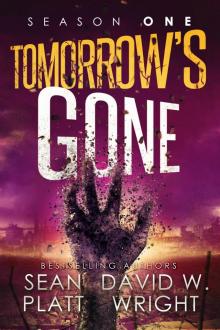 Tomorrow's Gone Season 1
Tomorrow's Gone Season 1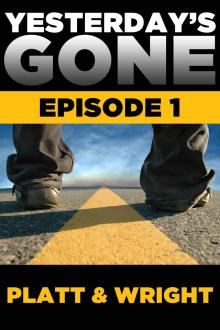 Yesterday's Gone: Episode 1
Yesterday's Gone: Episode 1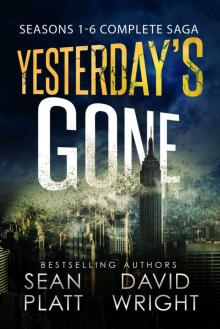 Yesterday's Gone: Seasons 1-6 Complete Saga
Yesterday's Gone: Seasons 1-6 Complete Saga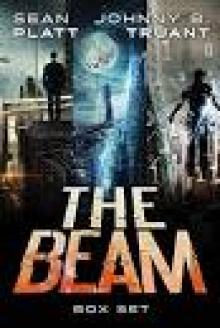 The Beam- The Complete Series
The Beam- The Complete Series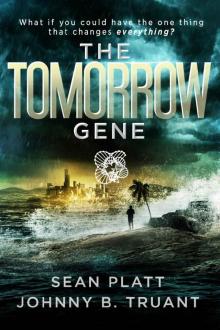 The Tomorrow Gene
The Tomorrow Gene Karma Police: Karma Police Book Two
Karma Police: Karma Police Book Two The Fall (Karma Police Book 5)
The Fall (Karma Police Book 5)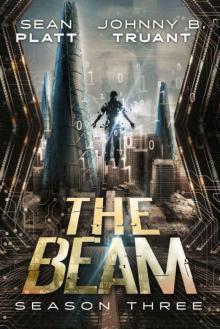 The Beam: Season Three
The Beam: Season Three Resurrection
Resurrection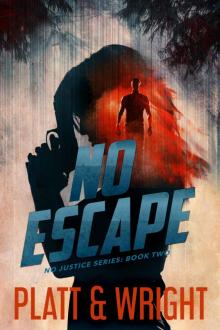 No Escape (No Justice Book 2)
No Escape (No Justice Book 2)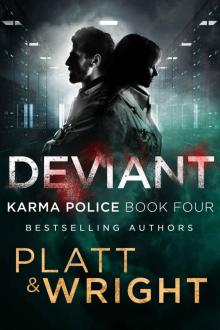 Deviant (Karma Police Book 4)
Deviant (Karma Police Book 4)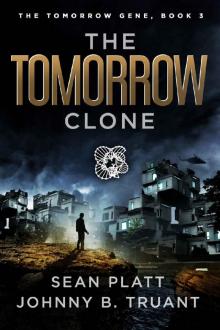 The Tomorrow Clone (The Tomorrow Gene Book 3)
The Tomorrow Clone (The Tomorrow Gene Book 3)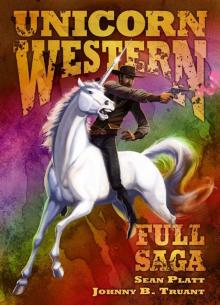 Unicorn Western
Unicorn Western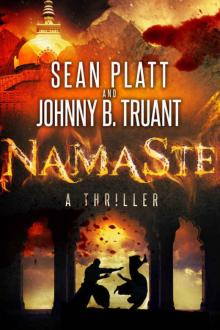 Namaste
Namaste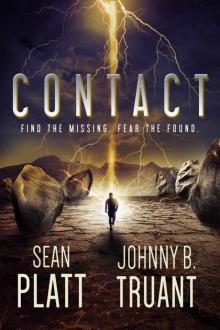 Alien Invasion (Book 2): Contact
Alien Invasion (Book 2): Contact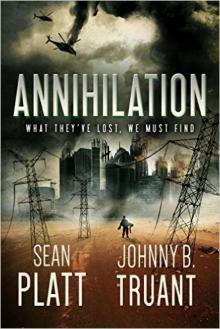 Alien Invasion (Book 4): Annihilation
Alien Invasion (Book 4): Annihilation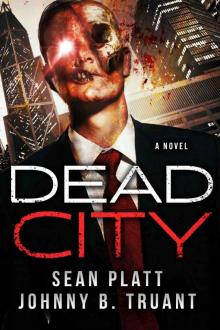 Dead City
Dead City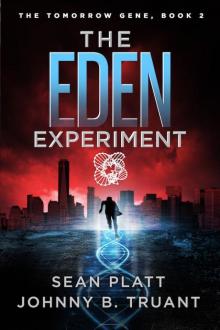 The Eden Experiment
The Eden Experiment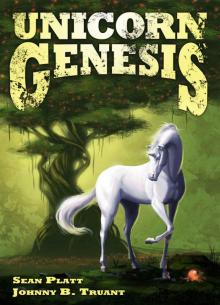 Unicorn Genesis (Unicorn Western)
Unicorn Genesis (Unicorn Western)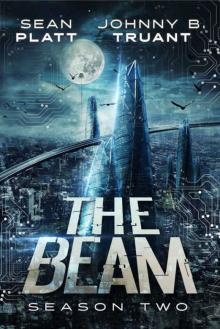 The Beam: Season Two
The Beam: Season Two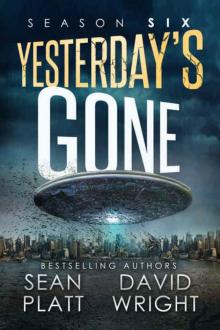 Yesterday's Gone: Season Six
Yesterday's Gone: Season Six Homecoming (Karma Police Book 6)
Homecoming (Karma Police Book 6)![[Alien Invasion 01.0] Invasion Read online](http://i1.bookreadfree.com/i1/03/30/alien_invasion_01_0_invasion_preview.jpg) [Alien Invasion 01.0] Invasion
[Alien Invasion 01.0] Invasion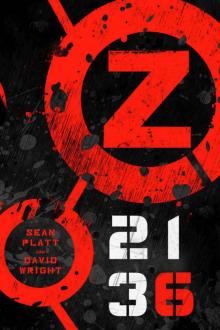 Z 2136 (Z 2134 Series Book 3)
Z 2136 (Z 2134 Series Book 3)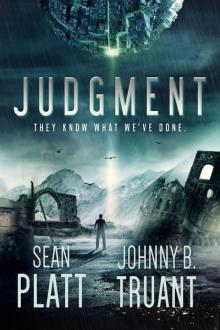 Alien Invasion (Book 5): Judgment
Alien Invasion (Book 5): Judgment Threshold
Threshold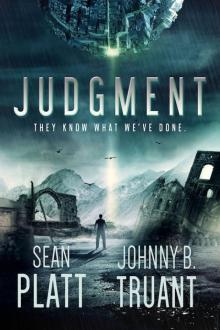 Judgment
Judgment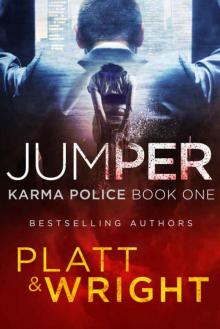 Jumper: Karma Police Book One
Jumper: Karma Police Book One Boricio Goes Camping (Dark Crossings)
Boricio Goes Camping (Dark Crossings)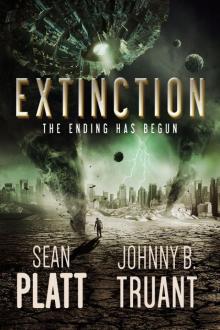 Extinction
Extinction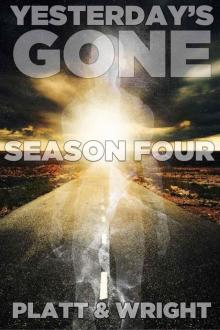 Yesterday's Gone (Season Four): Episodes 19-24
Yesterday's Gone (Season Four): Episodes 19-24![[No Justice 01.0] No Justice Read online](http://i1.bookreadfree.com/i2/04/09/no_justice_01_0_no_justice_preview.jpg) [No Justice 01.0] No Justice
[No Justice 01.0] No Justice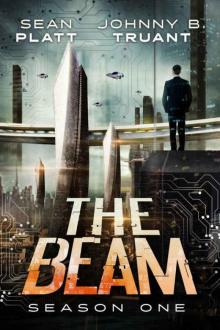 The Beam: Season One
The Beam: Season One La Fleur de Blanc
La Fleur de Blanc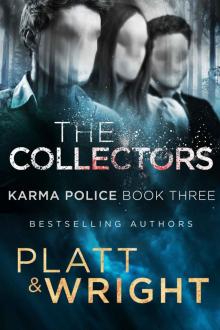 The Collectors (Karma Police Book 3)
The Collectors (Karma Police Book 3)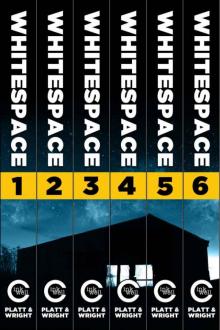 WhiteSpace: Season One (Episodes 1-6 of the sci-fi horror serial)
WhiteSpace: Season One (Episodes 1-6 of the sci-fi horror serial)